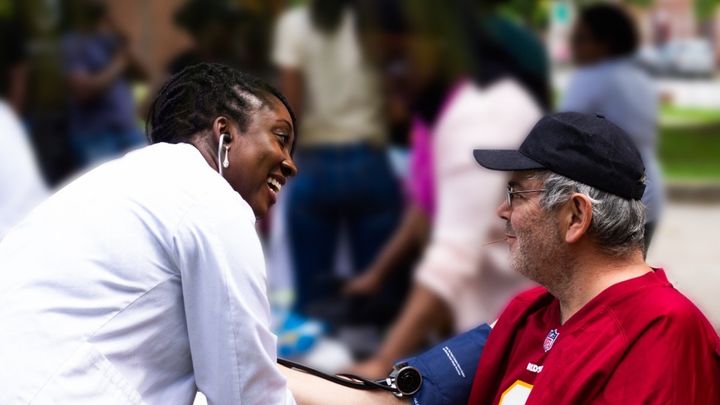
#MasksForOurRelatives
Tax deductible
The Distant Relatives Project (DRP), a non-profit, tax-exempt 501(c)(3) organization, is focused on three core pillars: education, health care and homelessness. We are dedicated to improving the lives of those living in underserved communities around the world.
The Coronavirus (COVID-19) is a respiratory illness that is transmitted person to person through small droplets. Originating in late December of 2019, this pandemic is impacting every aspect of our lives. For the homeless, COVID-19 is a new challenge in their already difficult lives.
The Masks For Our Relatives Campaign is created with a mission to reduce the transmission of COVID-19 in the community of people experiencing homelessness. The masks are made out of cotton, layered, washable and reusable. Members of our community are helping us sew the masks by standards published by organizations such as Vanderbilt Medical Center and Holy Cross Health.
Here are a few ways the homeless are particularly vulnerable to COVID-19:
1. Social Distancing and self isolation is nearly impossible
- Adult shelters operate at high density
2. The population of people who are experiencing homelessness is, on average, much sicker than the general population. This is due to not only their advanced age, but also their accelerated physical decline and mental weathering that frequently results from repeat exposure to harsh elements.
- 'A recent report by leading social scientists and homelessness experts analyzed exposure, hospitalization and potential mortality rates from coronavirus among people who are homeless. They found that homeless people who contract coronavirus are twice as likely to be hospitalized, two to four times as likely to require critical care and two to three times as likely to die compared to the general population.' - Diane Yentel, President and CEO of the National Low Income Housing Coalition.
- Existing studies of homeless populations have observed obstructive pulmonary disease prevalence between 20 and 30%, compared to 10% for the general population.
3. The lack of accurate or complete count of homeless people who have contracted the virus makes it hard to track and treat patients who may be in need of care. Inadequate access to health services, lack of sanitation and the difficulty to detect infections early increase the spread among the homeless community.
While cloth masks are not recommended for healthcare workers, cotton masks reduce the risk of transmission by more than 60% in the general public. Evidence has shown that those infected with coronavirus are sometimes contagious two days before the onset of symptoms. The CDC now recommends the public use of homemade face coverings when in public, reserving higher-grade protective equipment like n95 masks for hospitals and health care workers.
OUR GOAL IS TO MAKE 500 MASKS BY APRIL 15TH AND A TOTAL OF 1500 MASKS BY APRIL 30TH - please share and donate to help us purchase the material needed for these masks and to help our relatives in need!
The Coronavirus (COVID-19) is a respiratory illness that is transmitted person to person through small droplets. Originating in late December of 2019, this pandemic is impacting every aspect of our lives. For the homeless, COVID-19 is a new challenge in their already difficult lives.
The Masks For Our Relatives Campaign is created with a mission to reduce the transmission of COVID-19 in the community of people experiencing homelessness. The masks are made out of cotton, layered, washable and reusable. Members of our community are helping us sew the masks by standards published by organizations such as Vanderbilt Medical Center and Holy Cross Health.
Here are a few ways the homeless are particularly vulnerable to COVID-19:
1. Social Distancing and self isolation is nearly impossible
- Adult shelters operate at high density
2. The population of people who are experiencing homelessness is, on average, much sicker than the general population. This is due to not only their advanced age, but also their accelerated physical decline and mental weathering that frequently results from repeat exposure to harsh elements.
- 'A recent report by leading social scientists and homelessness experts analyzed exposure, hospitalization and potential mortality rates from coronavirus among people who are homeless. They found that homeless people who contract coronavirus are twice as likely to be hospitalized, two to four times as likely to require critical care and two to three times as likely to die compared to the general population.' - Diane Yentel, President and CEO of the National Low Income Housing Coalition.
- Existing studies of homeless populations have observed obstructive pulmonary disease prevalence between 20 and 30%, compared to 10% for the general population.
3. The lack of accurate or complete count of homeless people who have contracted the virus makes it hard to track and treat patients who may be in need of care. Inadequate access to health services, lack of sanitation and the difficulty to detect infections early increase the spread among the homeless community.
While cloth masks are not recommended for healthcare workers, cotton masks reduce the risk of transmission by more than 60% in the general public. Evidence has shown that those infected with coronavirus are sometimes contagious two days before the onset of symptoms. The CDC now recommends the public use of homemade face coverings when in public, reserving higher-grade protective equipment like n95 masks for hospitals and health care workers.
OUR GOAL IS TO MAKE 500 MASKS BY APRIL 15TH AND A TOTAL OF 1500 MASKS BY APRIL 30TH - please share and donate to help us purchase the material needed for these masks and to help our relatives in need!
 Co-organisers (5)
Co-organisers (5)
Messai Bogale Belayneh
Organiser
Seabrook, MD
The Distant Relatives Project
Beneficiary
Gilford Nana
Co-organiser
Jason Akyea
Co-organiser
William Asiedu
Co-organiser
Yanet Adere
Co-organiser